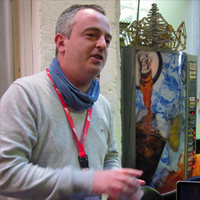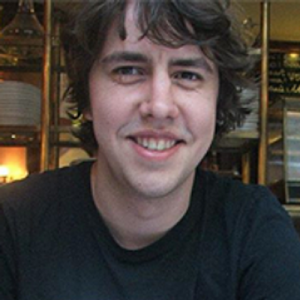
Title: Control Theoretical Models of Pointing
Speaker: Rod Murray-Smith, University of Glasgow
http://www.dcs.gla.ac.uk/~rod/
Abstract: I will talk about two topics:
1. (Joint work with Jörg Müller & Antti Oulasvirta) I will present an empirical comparison of four models from manual control theory on their ability to model targetting behaviour by human users using a mouse: McRuer’s Crossover, Costello’s Surge, second-order lag (2OL), and the Bang-bang model. Such dynamic models are generative, estimating not only movement time, but also pointer position, velocity, and acceleration on a moment-to-moment basis. We describe an experimental framework for acquiring pointing actions and automatically fitting the parameters of mathematical models to the empirical data. We present the use of time-series, phase space and Hooke plot visualisations of the experimental data, to gain insight into human pointing dynamics. We find that the identified control models can generate a range of dynamic behaviours that captures aspects of human pointing behaviour to varying degrees. Conditions with a low index of difficulty (ID) showed poorer fit because their unconstrained nature leads naturally to more dynamic variability. We report on characteristics of human surge behaviour in pointing. We describe trade-offs among the models. We conclude that control theory offers a promising complement to Fitts’ law based approaches in HCI, with models providing representations and predictions of human pointing dynamics which can improve our understanding of pointing and inform design.
2. Casual control. How and why we can design systems to work at a range of levels of engagement.
Biography: Roderick Murray-Smith is a Professor of Computing Science at Glasgow University, in the “Inference, Dynamics and Interaction” research group and the Head of the Information, Data and Analysis Section. He works in the overlap between machine learning, interaction design and control theory. In recent years his research has included multimodal sensor-based interaction with mobile devices, mobile spatial interaction, Brain-Computer interaction and nonparametric machine learning. Prior to this he held positions at the Hamilton Institute, NUIM, Technical University of Denmark, M.I.T., and Daimler-Benz Research, Berlin, and was the Director of SICSA, the Scottish Informatics and Computing Science Alliance. He works closely with the mobile phone industry, having worked together with Nokia, Samsung, FT/Orange, Microsoft and Bang & Olufsen. He was a member of Nokia’s Scientific Advisory Board and is a member of the Scientific Advisory Board for the Finnish Centre of Excellence in Computational Inference Research. He has co-authored three edited volumes, 22 journal papers, 16 book chapters, and 88 conference papers.
News

Title: Designing Real-time Interactions Using Machine Learning
Abstract: Supervised learning algorithms can be understood not only as a set of techniques for building accurate models of data, but also as design tools that can enable rapid prototyping, iterative refinement, and embodied engagement— all activities that are crucial in the design of new musical instruments and other embodied interactions. Realising the creative potential of these algorithms requires a rethinking of the interfaces through which people provide data and build models, providing for tight interaction-feedback loops and efficient mechanisms for people to steer and explore algorithm behaviours.
In this talk, I will discuss my research on better enabling composers, musicians, and developers to employ supervised learning in the design of new real-time systems. I will show a live demo of tools that I have created for this purpose, centering around the Wekinator software toolkit for interactive machine learning. I’ll discuss some of the outcomes from 7 years of creating machine learning-based tools and observing people using these tools in creative contexts. These outcomes include a better understanding how machine learning can be used as a tool for design by end users and developers, and how using machine learning as a design tool differs from more conventional application contexts.
Biography: Dr. Rebecca Fiebrink is a Lecturer at Goldsmiths, University of London. Her research focuses on designing new ways for humans to interact with computers in creative practice, including on the use of machine learning as a creative tool. Fiebrink is the developer of the Wekinator system for real-time interactive machine learning (with a new version just released in 2015!), a co-creator of the Digital Fauvel platform for interactive musicology, and a Co-I on the £1.6M Horizon 2020-funded RAPID-MIX project on Real-time Adaptive Prototyping for Industrial Design of Multimodal Expressive Technology. She is the creator of a MOOC titled “Machine Learning for Artists and Musicians,” which launched in 2016 on the Kadenze platform. She was previously an Assistant Professor at Princeton University, where she co-directed the Princeton Laptop Orchestra. She has worked with companies including Microsoft Research, Sun Microsystems Research Labs, Imagine Research, and Smule, where she helped to build the #1 iTunes app “I am T-Pain.” She holds a PhD in Computer Science from Princeton University.

Title: Data and Dasein – A Phenomenology of Human-Data
Relations.
Abstract: In contemporary society, data representation
is an important and essential part of many aspects of our daily lives.
In this talk Trevor will present how his doctoral research has
contributed to our understanding on how people experience data and what
role representational modality plays in the process of perception and
interpretation. This research is grounded in phenomenology – he aligns
his theoretical exploration to ideas and concepts from philosophical
phenomenology, while also respecting the essence of a phenomenological
approach in his choice and application of methods. Alongside offering a
rich description of people’s experience of data representation, the key
contributions of his research transcend four areas: theory, methods,
design, and empirical findings. From a theoretical perspective, besides
describing a phenomenology of human-data relations, he has defined, for
the first time, multisensory data representation and established a
design space for the study of this class of representation. In relation
to methodologies, he will describe how he deployed two elicitation
methods to investigate different aspects of data experience. He blends
the Repertory Grid technique with a focus group session and shows how
this adaption can be used to elicit rich design relevant insight. He
will also introduce the Elicitation Interview technique as a method for
gathering detailed and precise accounts of human experience.
Furthermore, he will describe how this technique can be used to elicit
accounts of experience with data. In his talk Trevor will present the
findings of a series of empirical studies, these show, for instance, how
certain representational modalities cause us to have heightened
awareness of our body, some are more difficult to interpret than others,
some rely heavily on instinct and each of them solicit us to reference
external events during the process of Interpretation.
Biography: Trevor Hogan is a Lecturer of Interaction
Design at the Cork Institute of Technology, Ireland. The aim of his
research is to describe and better understand how embodiment influences
and augments people’s experience of data representations. His work is
strongly interdisciplinary and may be situated in the field of
interactive design, but at the intersection of tangible computing,
human-computer interaction, information visualization and psychology. At
CIT Trevor leads the Human-Data Interaction Group, a multidisciplinary
research team, whose aim is explore novel ways of representing data –
through and beyond the visual modality. This group is also focused on
exploring methods and approaches that broaden the evaluation criteria of
data representation – beyond traditional measurements, such as
efficiency and effectiveness, towards novel aspects such as experience,
use qualities, hedonics, affect, empathy, and enchantment.
Title: Argument Technology and Argument Mining
Abstract: Argument Technology is that part of the overlap between theories of argumentation and reasoning and those of AI where an engineering focus leads to applications and tools that are deployed. One significant step in the past decade has been the development of the Argument Web — the idea that many of these tools can interact using common infrastructure, with benefits to academic, commercial and public user groups. More recently, there has been a move towards linguistic aspects of argument, with NLP techniques facilitating the development of the field of Argument Mining. Drawing on the academic success and commercial uptake of techniques such as opinion mining and sentiment analysis, argument mining seeks to build on systems which use data mining to summarise *what* people think by explaining also *why* they hold the opinions they do.
Biography: Chris Reed is Professor of Computer Science and Philosophy at the University of Dundee in Scotland, where he heads the Centre for Argument Technology. Chris has been working at the overlap between argumentation theory and artificial intelligence for over twenty years, has won over £5.6m of funding from RCUK, government and commercial sources and has over 150 peer-reviewed papers in the area including five books. He has also been instrumental in the development of the Argument Interchange Format, an international standard for computational work in the area; he is spear-heading the major engineering effort behind the Argument Web; and he was a founding editor of the Journal of Argument & Computation.

Title: Recycled Resources and Learning Communities
Abstract: The concept of learning communities can be seen as central in higher education, especially. Learning is fostered by dialogue, which is implicated in processes of conceptual development and alignment. These rich and complex phenomena include learning through witnessing the learning experiences of others — “vicarious learning” (VL). We propose that VL can be exploited by using rich media (such as video) to capture and share learning experiences. But the potential of rich media is broad and seems to be curiously under-exploited in education. One can envisage learning communities that create and build around learning resources of diverse kinds, using new materials but also integrating many strands of existing materials. In a number of encouraging ways, the available technologies already support this, but are often not greatly used, which suggests a challenge for design. How can we make these technologies more usable for our learning communities? A couple of exploratory approaches are discussed, including an informal experiment upon which it is hoped to build further.
Biography: John Lee is Professor of Digital Media at the University of Edinburgh. He holds a PhD in Philosophy and Cognitive Science, from Edinburgh. He works jointly in the School of Informatics and the Edinburgh College of Art, where he directs the long-standing MSc programme in Design and Digital Media. His research interests centre around cognition and communication in design and learning. For some time, he has been investigating the paradigm of “vicarious learning” and the question of how rich media resources can be used more effectively in applications of learning technologies.

Abstract: In this talk I will discuss how deep learning can be applied to character animation. I will present a framework based on deep convolutional neural networks that allows for motion synthesis and motion editing in the same unified framework. Applications of this framework include fixing corrupted motion data such as that from the kinect, synthesis of character motion from high level parameters such as the trajectory, motion editing via arbitrary cost functions, and style transfer between two animation clips.
Biography: Daniel Holden is a PhD student at Edinburgh University studying how deep learning and data driven artistic tools can be used to save time in the production of high quality character animation. Outside of research he maintains several open source C projects and has a wide variety of interests including theory of computation, game development, and writing short fiction.

Abstract
As part of an EPSRC project into text entry for older adults we ran a series of workshops on the design of new keyboard for older adults. These workshops blew away some of the stereotypes of older adults – ours were well connected, adjusted text style for twitter vs email vs facebook and were more open to new keyboard layouts than our undergraduates. Error awareness was highlighted as a concern and we developed an Android keyboard that highlights errors and autocorrections. In this talk I’ll review some of our experimental keyboards, the main lessons from our highlighting keyboard, main lessons in study design for older adults and future directions.
Biography
Since 2000, Mark Dunlop has been a senior lecturer in computer science at Strathclyde. His research focuses on usability of mobile systems including mobile text entry, visualisation, sensor driven interaction and evaluation of mobiles. His first work on mobile text entry was published in 1999 and he’s been involved in the organisation of the MobileHCI conference series since it’s inception in 1998. Recent project involve text entry for older adults and mobile based driving crowdsourced braking alert system. His teaching is mainly in human computer interaction (HCI) and mobile/internet programming technologies. Prior to joining Strathclyde, Mark was a senior researcher at Risø Danish National Laboratory and a lecturer at Glasgow University. He completed his PhD in Multimedia Information Retrieval at Glasgow in 1991.
Abstract
Perhaps the term computer ‘memory’ has led people to believe that human memory has to be perfect and infallible. Many people worry when they realise they forget and some turn to recording and collecting as much as they can, e.g. photos or videos through life logging. Some people assume that by collecting they can avoid forgetting or at least have access to the information anytime later. And that is where they might be wrong. First of all, recordings are not equivalent to memories, and memories ‘can not be stored’. Secondly it has already been shown that people collect too much and organize too little for them to be able to find information later [1]. Thirdly, human memory works best when we forget… a lot.
MORE
Abstract
There is a huge and complex social psychology to managing client engagements effectively. Merely presenting actionable solutions that have valid data to back them up is not enough for clients. They become lost with the simplest of justifications and proof often focusing factors of little importance to the end users. In this talk I will offer some meeting navigation concepts that will enable people to facilitate client meetings, establish and reach defined outcomes and establish clear dialog and interaction methods.
Abstract
Visualising dynamic graphs is important for many application areas. For social media networks, they can help us understand the interaction and interests of users online. In biology, they can illustrate the interactions between genes and biological processes. Understanding and designing effective visualisation methods for dynamic network data is fundamental to these areas as well as many others. In this talk, we focus on the effective presentation of dynamic networks. In particular, we summarise recent results on dynamic graph visualisation with respect to animation (presentation of interactive movies of the data), small multiples (presenting the data through several linked windows like a comic book), and drawing stability (the visual stability of the data presentation). We conclude with some recent work on scalable graph visualisation and in the visualisation of sets and their intersections.
MORE


